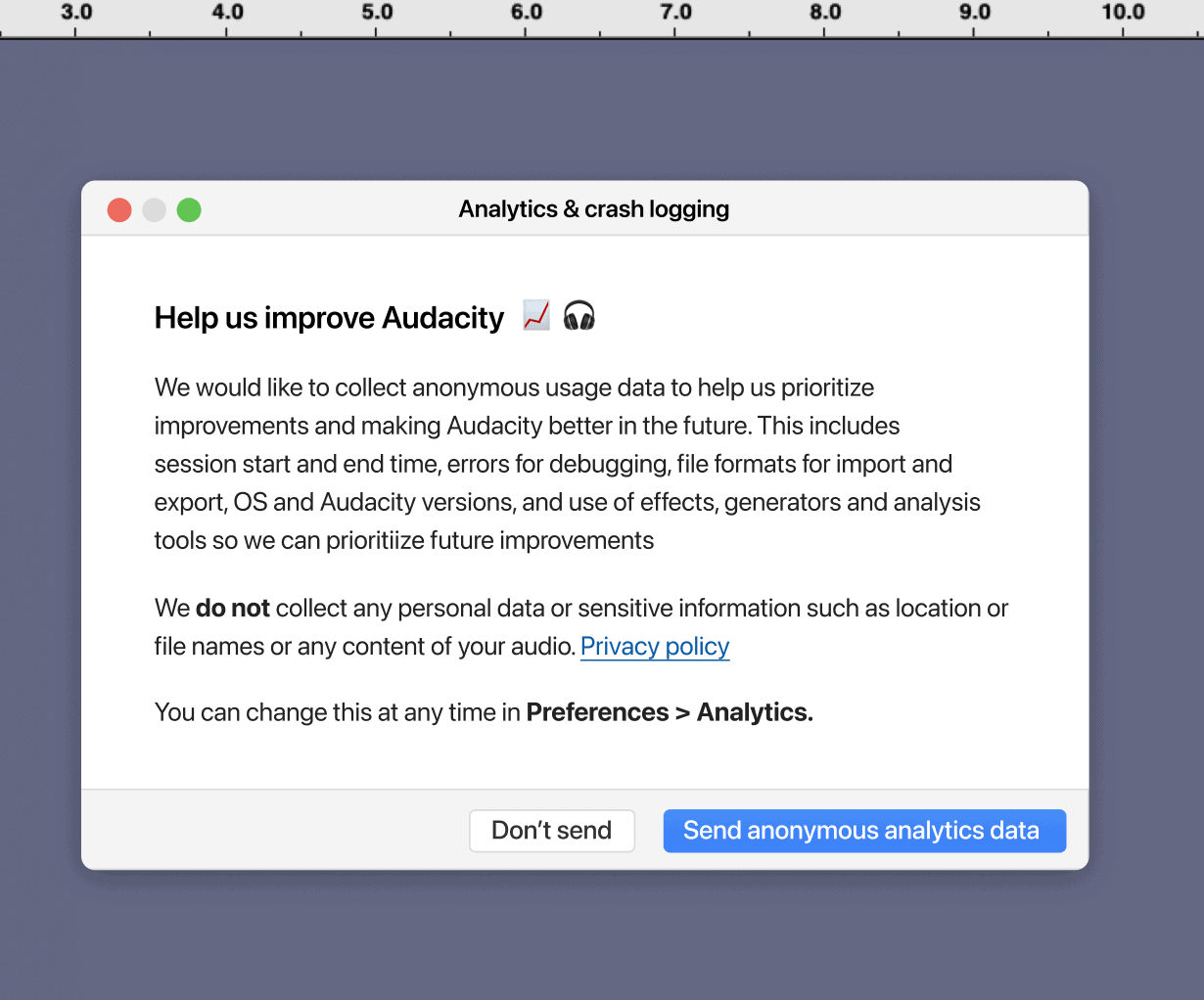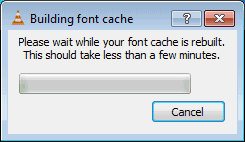Audacity is introducing Telemetry, but in a good way

Future versions of the open source cross-platform audio editor will make use of Telemetry to improve development of the application.
Imagine the following scenario: the ownership of a popular program changes and one of the first new things that will get added is Telemetry. Most users would probably assume the worst, that Telemetry is added for marketing purposes or worse.
In the case of Audacity, that is not the case. There are two main ways that developers introduce Telemetry into an application: the first makes it opt-out, so that all users of the application who upgrade to the new version or install it will have data collected and transferred to the developer. The second way makes the data collecting opt-in, which means that users will have to enable Telemetry willingly before data is collected and transferred.
Audacity's collecting of Telemetry will make use of the second option. In other words: nothing gets collected and submitted by default.
But why Telemetry in the first place? The developers explain that they need some data to make informed decisions. In one of the provided examples, the developers state that Telemetry would help them make educated decisions in regards to removing support for old versions to upgrade important components that these older versions don't support anymore. In another, the developers use the data to determine the extend of a critical issue that has been reported to them. Should development focus on an emergency fix because the issue could potentially affected a lot of users, or is affecting few users only?
As far as Telemetry is concerned, it will be opt-in and disabled by default, only included in the official GitHub releases and not when developers compile Audacity from source.
Audacity plans to use two providers, Google and Yandex initially. Google with Google Analytics to collect the following information:
- Session start and end
- Errors, including errors from the sqlite3 engine, as we need to debug corruption issues reported on the Audacity forum
- Usage of effects, sound generators, analysis tools, so we can prioritize future improvements.
- Usage of file formats for import and export
- OS and Audacity versions
Yandex with Yandex Metrica to "correctly estimate the daily active users correctly". The developers revealed that they are open when it comes to changing solutions if the same level of information is provided.
Now You: do you allow Telemetry in any of your programs or apps?























Could someone please point me to a 3.0.2 Linux executable? I am on Kubuntu amd64.
Give them an inch and they take a mile, especially when they involve google. I am uninstalling audacity. I would rather pay for a DAW.
Ha ha ha (imagine this for 3 minutes) …they have the Audacity to put telemetry.
Now, it should be by law that every time one of this popups or similar dialog appears,
it should ask the user:
Are you stupid?
button to decline: No, you are.
button to acept: Yes, I am, here is the proof.
Good bye Audacity and welcome Wavesaur. Works very well an uses much less HDD space.
https://www.wavosaur.com/
Thanks for sharing. Its a really nice replacement! Opens audio files much faster than Audacity. Its portable and lightweight another two plus!
Similar to malware, telemetry has taken on wide ranging meanings. To make a call or use data on a phone, some telemetry is needed; if I’m editing videos offline, none is needed.
So yeah, if telemetry is essential to what I’m doing, fine. If not, unfine. Telemetry claimed to be for product improvement never seems to end up improving anything. It’s marketing gibberish to me; goes into a black hole or is sold to ad co’s.
What Audacity is doing isn’t cool but you can avoid their data collection for now. Keep an eye on your network connections and block the program from going out in your firewall if desired.
If they do what CCleaner did (I’ll give them some credit for not being that scummy) by introducing more and more data collection, malware, not working unless online, etc., Audacity is toast. There are many replacements for them just like CCleaner.
If you open the Audacity for Linux page, a download window opens. That should never happen, what else is messed up? Kids are running the store, see if you find the same:
https://www.audacityteam.org/download/linux/
Coming out’s a bitch!
> If you open the Audacity for Linux page, a download window opens. That should never happen, what else is messed up?
ULBoom, let’s keep the focus on the telemetry and not muddy the waters with such obviously bogus complaints. What you linked to is NOT the “Audacity for Linux page”, it’s the “Audacity for Linux DOWNLOAD page”. The page clearly states that the download will start in 5s, with a countdown timer. The “Audacity for Mac DOWNLOAD page”, “Audacity for Windows DOWNLOAD page” etc. all behave the exact same way, and I see nothing wrong with it. Lots of download pages auto-launch the download since that’s what people came there for after all.
There’s no need to cook up bogus issues to try and show how Audacity has turned into malware. We need to keep the pressure on them to remove the telemetry, or move en masse to a clean fork. The drastic shrinking of their user base will do more to convince them than anything else ever will.
People make so much drama about this, the only reason Audacity is popular is because it is Free, it doesn’t matter if features are good or not, or how many bugs happen or not or its uses and how good it does it or not, people use it because by luck it got the first place to be the most popular and supported open source app, if it wasn’t Audacity it would be another app, but free open source apps always get justified based on the free price tag and nothing else, so having telemetry… does it even really matter?
Starting with It is an audio editor and with audio editors you don’t need internet, why do you need internet to use it? block it with the firewall (like you should have most of your apps anyway) and move on, I fixed the problem for you all crying about this.
But the main issue I see here is, why are people serious about using a program like Audacity, if you are serious about recording and editing audio, Audacity shouldn’t be what you should care for, I would think a little serious person would first look at a DAW, because being honest, for what I see people using Audacity, a DAW would be find and better, since DAWs are non-destructive, for example Reaper which is $60 even offers spectral editing, which not many DAWs do, but that could help if for some reason you need something like that to get rid of clicks or whatever easily. And if for some some reason you really need a audio wave editor, there are some programs that are not expensive (unless you buy their pro versions) that will do a better job than audacity, the best audio editor in my opinion is Acoustica by Acon Digital which has a standard version, also Soundforge by Magix is still great and cheap. Of course, I am not going to mention overexpensive stuff like Izotope RX, or expensive Steinberg stuff like Wavelab that needs the awful usb e-licenser or Adobe Audition which I used to love until Adobe switched to subscription only. I think Acoustica even the premium version offers more at a cheaper price and you can communicate with developer and all.
I think people are crying for what is not worth it. I don’t even use Reaper but it even offers an unlimited trial after 60 days, and a Linux version (since I saw someone mentioning Linux) of course they expect you to pay it but they don’t stop you from using it because they didn’t focus on licensing stuff. So just my opinion and some people might disagree and would want a destructive audio workflow program to just cut audio and stuff like a podcast, even if DAWs would do that, more and better.
@Willy Donka or Rick Beller (from your comment on the previous Audacity article) or whatever you wanna call yourself today:
$60 ain’t cheap in huge parts of the world FYI. Would a paid DAW be better than free Audacity? Probably, but why the *beep* should people care? Why the hell would they NOT use a free program that offers the features they NEED, even if better paid ones are available? Your entire argument sounds exceedingly silly, and entirely ignorant of how and why the average user picks something to quickly get a decent job done. You might be an audio pro or something, but Audacity users in general aren’t, and your antipathy towards the program is really weird to say the least. (Or perhaps not that inexplicable if you’re the developer of some DAW and thus are super jealous of Audacity’s popularity.)
So that’s how you cripple the Linux movement, just buy up the applications and fuck with them.
FORK time!
It’s a cross-platform (know what that means?) audio editor. “cripple the Linux movement”? WTF have you been smoking?
Unfortunately Ocenaudio is not FOSS (yet?).
“Audacity plans to use two providers, Google and Yandex initially” – “In a good way”, yeah, haha.
@Honorius: Sad to say, those were my exact thoughts. Limited, opt-in, in-house telemetry is one thing. Outsourcing telemetry to Google and Yandex is quite another.
Opt-in is the first step, just to keep the users quiet. Then another step will be taken “Opt-in has been chosen by very few users, so we have to make telemetry mandatory”. No, thanks for the goodie. Audacity won’t be great any longer, I suspect. Especially when Yandex, Google and Russians appear (not anti-Russian, just in the context) . I’ve used Audacity for years but now that the program is being killed I’m gonna look for other options.
Ocenaudio, looks like a worthy replacement
link: https://www.ocenaudio.com/en/download
(no affiliation with dev etc..) cross OS platforms, pehaps ashwin could do a blog on it ;-)
No! I disable telemetry on everything. No, I am not doing anything questionable, immoral, illegal, or whatever…but I don’t like telemetry.
Telemetry (asside from privacy) slows things down, and has a history of being abused. I won’t dump audacity, but I will just not upgrade to a newer version.
I, too, disable all telemetry wherever I find it. If we were living in normal times without extensive mass surveillance at each turn, I wouldn’t have a problem allowing telemetry about some mundane things like how often I use a program. But with the amount of data seeping out from my control and the numbers of corporate actors trading and aggregating it, it’s become vital to say ‘no’ whenever you can, because you have no way of knowing how seemingly innocuous data may be used at some distant time.
The first steps downhill on a slippery slope after the sale of the program?
Typical behavior after adopting app/tech/firm:
– keep the users, add some opt in features
– add some more features
– make them depend on the features
– cancel opt in
Welcome to our walled garden of happiness. :o)
Saw it many times.
Fell for it twice.
So you might excuse my disbelieve. ;)
Seems to be a forest vs trees analog at play here.
Anyone who uses a credit card, cell phone, any retailer points program, etc has given up their “anonymity”.
If minor things like this of Audacity is such a concern as to motivate one to dump the program, what are those individuals doing with Audacity that exceeds the info they give out with credit card use?
If they aren’t using credit cards or other tools of modern society, but have the wherewithal and chops to lock down their pc to the nth degree, then all the more power to them.
Not a very interesting life being worried and suspicious of every little “possibility”.
@BM: That’s a pretty weak argument for giving up more data. Even if a person chooses to engage with surveillance in some areas of life, does that mean he has to accept it everywhere without question? Do you draw no distinction between the various companies and the tradeoffs they offer? What about cases where there is no viable alternative to surveillance – are we to give up in everything because we are forced to accept it in some areas?
But the entire premise of your argument is wrong, because there are plenty of people (more with each passing day) who are taking steps to limit their exposure to surveillance. In my case, I minimize my credit card use, do not use points cards except for the gas station, have a degoogled phone, strongly avoid online shopping when an in-person option is available, etc. In other words, I’m managing to live in a modern society (whoop-dee-doo…) without doing all the things you suggest are necessary to do. Why on earth would I just casually accept some Google and Yandex iny Audacity installation?
I think that corporate surveillance in some parts of the world is on its way out, though it will take time to get there. Look at how Apple is slowly changing. I suspect that 25 years from now people will look back on this era’s tech giants the way we today look back on the tobacco companies.
So what you’re saying is, we’ve already given up our anonymity to banks (credit card issuer) and telecom providers (mobile no. issuer), so why complain about telemetry being added to FOSS like Audacity? Seriously? Probably the most stupid false equivalence I’ve come across ever.
I’m not opting in.
bye-bye, audacity
So what you mean is Audacity is becoming spyware in the first step on its course to licensing changes and future commercial-only release by Muse. Can you explain the ‘good way’ part ?
We all know how this movie ends. Guess I won’t be upgrading to new versions anymore. A fork can’t come soon enough.
I dislike telemetry cause it’s slowdown innovation, instead on focusing on new innovative features it focalise the développement around what most used features users already use as priority.
It’s prioritizing popular features instead of useful and innovative features no matter their popularity.
We can see what happen with such type of development (based on telemetry) with Mozilla/Firefox and Windows 10.
It’s not about usefullness or innovations but about popularity when you use telemetry like Mozilla/Microsoft.
Forum are a lot better to know what users want or need because people who take the time to participate are really concerned by the software and it’s those power-users that will spread the word about the software to casual users.
I like when developers use data to improve products because it should mean bugs get killed faster. Not all telemetry is evil. The fact that you have to opt in is a good start.
I may understand enthusiasts of Google, but “good” Yandex sounds pathetic fun. You made my day :)
“Good” Google is the worst oxymoron possible.
I rarely use Audacity so suspect my fumblings (mostly trying to remember how to remove surplus ‘nothing’ at the beginning or end of tracks) will be of little use to the developer. There has to be a better way!
RealPlayer’s Trimmer tool is easy to use, but as far as I know, the only way to get it is to download RealPlayer. That’s a lot just for Trimmer, and the privacy policies might not be acceptable anyway.
I agree that the “opt-in” way is the proper way to use telemetry, but I don’t think that adding telemetry as the first thing after Audacity ownership change shows a very bright future for the project.
I knew some BS like this would happen under the new owner. RIP Audacity. I’m moving to WavePad Sound Editor.
Yes, I allow telemetry in selected applications. Windows and Firefox, for example.
I do that because I believe it is important to let ‘them’ know that there are people that use ‘it’ in a different way. Hopefully that helps to make better decisions and give me an application that is more suited for my needs.
(I’m realistic about it though; it will not make the ribbon toolbar in applications go way. Unfortunately :)
But using Google Analytics for that is completely unnecessary. It could just as well be uploaded directly to the servers of Audacity.
This will put you in the very specific Google FLoC (Federated Learning of Cohorts) “Music Fanatic/producer/engineer”, which is certainly worth quite some money in the advertisement industry.
A very balanced response, @Maarten.
>> But using Google Analytics for that is completely unnecessary. It could just as well be uploaded directly to the servers of Audacity.
Couldn’t agree more with you. Just the mention of my data being routed through Google in particular give me the creeps.
I don’t use any software that includes Google, Facebook, or Yandex code. If you want to learn about user behaviour, just ask on your website, and the most active users will tell you. Or, worse come to worse, add a popup to the application asking to voluntarily fill out a form… preferably an online form that is not associated with the app and has no tracking info.
Also, learning about the total number of users obviously is not used for improving their code. So I’m not buying that story without more details.
They’ll got plenty of user behavior data when we all move to other software solutions.
Dont deprive them of that precious data, switch today.
“Check the box to consent to your data being stored in line with the guidelines set out in our privacy policy”
CLOWN WORLD
For what I’m aware of telemetry is banned to the extent of my skills.
I do of course understand the huge difference between opt-in and opt-out but in both cases I’ve always been confronted to my ignorance of what — exactly — is gathered by telemetry. We often read about “anonymous telemetry” but am I over-reacting when I suspect anonymity of being *possibly* a plain lie? The point is that I just don’t know and that within doubt I choose precaution hence a systematic refusal of telemetry. Dedicated tools exist in order to analyze the content of data transfers, I do check ins and outs but not their content, requires the tools and the user’s skills, and time : do we have to consider such a bother as natural?!
In terms of plain psychology I admit that telemetry, even clean, anonymous, gives me the feeling of being a guinea pig. I can understand nevertheless the reasons as exposed in the article and, from there on, on that basis, put aside the feeling. This would be a very specific reconsideration of those feelings. In psychiatry they say that when rationalism is confronted to emotions the latter always wins. Maybe not always in my case but not too sure.
Let’s say that I’d accept Audacity’s opt-in choice for telemetry in the terms described in the article : how would I know if nothing personal is added to the flow? Doubt, doubts. Looks like, at this time I’m unlikely to opt-in. We live in a digital era where the difference between telemetry and Big Data is not obvious, at least for users as myself, in a world where tracking has become a norm and this may lead to legitimate and healthy telemetry being banned on that ground.
I have downloaded v3.0.2, last known good, upon reading the previous article regarding this aquisition.
So long and thanks for all the fish.
For anyone interested:
https://github.com/audacity/audacity/releases/tag/Audacity-3.0.2
And wait until somebody makes a fork of it without this nonsense; switch to that one once v3.0.2 no longer cuts it.
While skimming through the source code, this is what I discovered is the information that Audacity will collect:
client UUID (apparently generated on a per-session basis)
Your OS name and version
Audacity name and version
Version number of wxWidgets
System language
when you start Audacity
when you close Audacity
when an exception/error occurs
when you import audio (file format, and whether import succeeded?)
when you export audio (file format, and whether export succeeded?)
when you apply an effect
when some kind of database error occurs?
when you open a window?
when you use the analyzer?
it also appears to store cookies???
okay am i missing something? hHw is using Google and Yandex analytics “good” even if ‘s opt-in (presumably only after a shitstorm).
@John
In the same way Leanplum or Adjust are being sold as “good” or “normal” around here.
@Iron Heart
Bothered to back up your nonsense with proof, something like someone’s quotes, link etc.
At least 2900 Github users (so far) disagree (so, yeah, definitely a shitstorm). I’m one of them. There is no reason any of my info regarding how I use an audio app needs to be piped over to Google. There are better ways to collect this info if that’s what this is really about.
To clarify, the Github users disagree with the assertion Audacity is introducing telemetry in a “good way”.